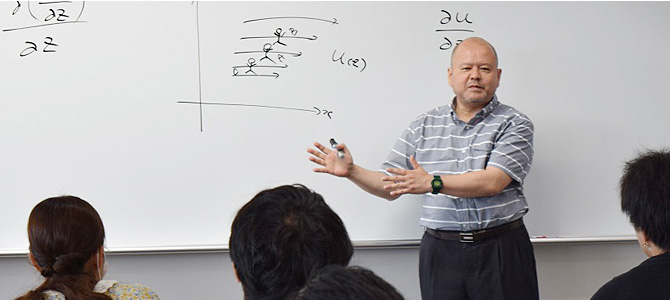Introduction to lectures
Water-Related Disaster Sciences
Professor Tomoyuki Takahashi
![[Water-Related Disaster Sciences] Professor Tomoyuki Takahashi](../img/lecture03_img01.jpg)
Q. Please tell us about the content of the Water-Related Disaster Sciences Lecture.
Here, we will learn about the occurrence mechanism, analysis method (simulation method), etc., of water related disasters such as tsunamis, storm surges, and floods. In this lecture, we will mainly learn about the theories behind such disasters, but a lecture called "Disaster Simulation" to which the theories are actually applied is also separately provided. In Disaster Simulation, students execute tsunami simulations using a computer. By mastering the content of these two lectures, students will be able to acquire knowledge / skills equivalent to those needed for the Japan Meteorological Agency's tsunami warning. Mathematics and physics are indispensable in these lectures, but as students with arts backgrounds can also take these classes, the necessary contents are narrowed down and are summarized in the textbooks.
During classes, students are frequently asked questions and opinions are requested of them. Students are prohibited from saying "I do not understand," and are obliged to answer something. It is made clear to students that we are not asking for correct answers but are asking students to think about things. Knowing the correct answer in social life is quite rare and sometimes there may even be many correct answers, so it is important to train students how to come up with their own correct answers through their own knowledge and experiences.
Feedback from the students who took the course ■ The theme was difficult, but the explanations were easy to understand and interesting. ■ It was good that I learned the habit of always being prepared because there are frequent short quizzes. ■ My understanding deepened by taking the lecture in conjunction with the related lecture "Disaster Simulation". ■ Even though there were difficult mathematical formulas, they were easy to understand because there were clear explanations with figures and the like. ■ Because I am from a science field, a class that deals with mathematical formulas in this way was very interesting. As for the field of physics also, because the explanations were given in an easy-to-understand manner, understanding the lessons became easier. ■ It is a lecture where you can feel the sense of enthusiasm of the lecturer. I felt that consideration was given to each student so that effective learning is possible.
Q. What is the merit of learning in the environment of the "fusion of arts and sciences"?
It is very important for the students who have mainly received education in the arts to grasp and have a sense for the sciences (such as the ability to evaluate objects quantitatively and objectively). Similarly, for the students who have mainly received education in the sciences, they need to obtain a sense for the arts (such as the ability to develop designs while considering the social system and people’s way of feeling / thinking). Interdisciplinary education is important for nurturing human resources who would then become leaders of society. However, learning knowledge in various fields is not important itself. The important thing is the ability to integrate and utilize a wide range of knowledge.
In the area of social safety and security, there are many things that are becoming black boxes that cannot be seen from the outside. For example, as for the “Warnings of the Japan Meteorological Agency" and the "Hazard Maps" issued by local governments, despite the fact that many citizens, municipal disaster prevention personnel, infrastructure companies, etc., are using them, most of these people do not know how they are created. However, I think that students studying at the Faculty of Societal Safety Sciences would not be satisfied with only knowing about the black box, but would be interested in their contents thereof.

Message to the candidates Faculty students must train not only to absorb knowledge but also how to use it. "Graduation Research” is compulsory for students of the Faculty of Societal Safety Sciences. In Graduation Research, many things will go contrary to expectations, but the experience of failing like that is important. Check the cause of why it failed, think about how to improve it, and try again. By repeating this process, students' problem-solving abilities are improved and skills to deal with various other problems are acquired.
Comment of a seminar student Professor Takahashi sees the students' ability to understand, and adopts a friendly lecture policy according to it. Moreover, in addition to being enthusiastic about providing guidance to students of his seminar, Professor Takahashi will not immediately provide the answer if a seminar student hits a wall in his/her graduation research, but rather indicates the way of thinking to approach the target. Thus, the seminar students can acquire the ability to think naturally on their own on a daily basis. I have only been in the Takahashi seminar for about half a year, but I feel that I am steadily growing, step by step! *This article is as of December 2016.